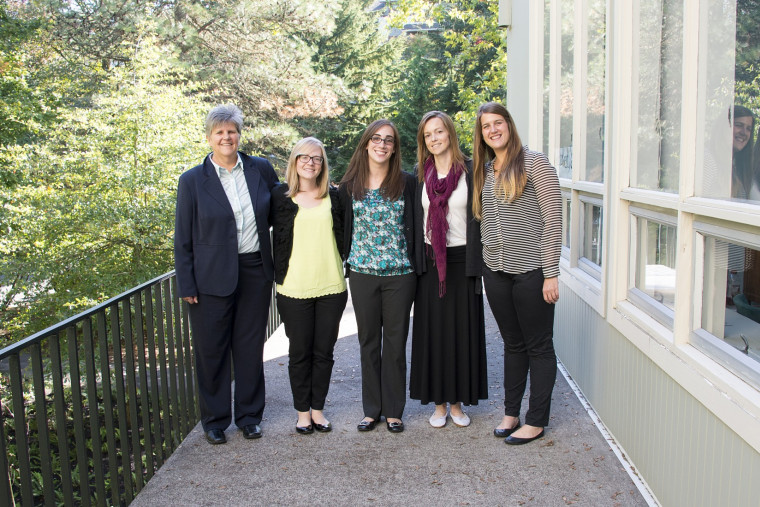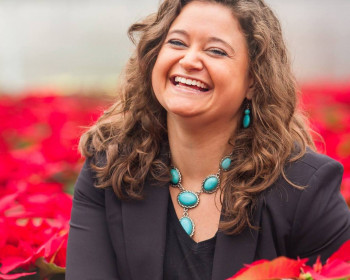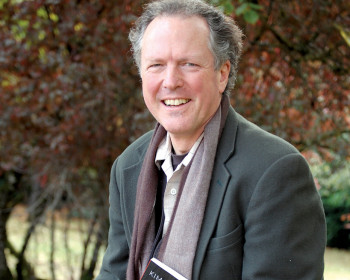Starting Up
Open gallery

Leading up to her master’s thesis, Katie Fraser (MA ’12) discovered an unnerving trend. When patients with eating disorders shift between residential, day treatment care, and home, many relapse into old habits under the strain of the transition. To confront the problem, Fraser launched a pilot study, where graduate students mentored patients at a residential eating disorder facility. Later, she recruited Cayla Panitz (MA ’12), to train graduate students as “recovery guides,” clinical mentors who provide behavioral coaching by accompanying clients on grocery shopping trips and other daily tasks, and giving them someone to talk to. Alishia Blevins (MA ’12), and Kelly Pertzsch (MA ’11) served as two of the first guides. Her experiment proved popular—30 graduate students and therapists expressed interest in becoming recovery guides and over 95 percent of clients wanted to partner with a guide.
Fraser measured the program’s effect in both quantitative and qualitative terms, through the Eating Disorder Inventory-3 and Revised Ways of Coping Checklist and interviews. After hearing from a client who said she couldn’t have gone on without the love, hope and courage her guide nourished, Fraser and her peers saw in their results a sustainable business idea.
The study’s feedback left the four alumnae excited, but unsure about navigating the legal, monetary, and technical challenges of starting a new business. Last February, they entered their start-up RootED Recovery in a new year-long venture competition at Lewis & Clark, where they shaped their mission, engaged in one-to-one mentoring, and vied for funding alongside a contemporary African clothing boutique, a resource-sharing website and a group of urban mushroom farmers.
“We’re all therapists, so we don’t have a lot of business background,” Fraser said.
“We needed to figure out how to scale up our product to reach an expanded population.”
In the spring of 2012, the venture competition whittled 42 entrants to 11 teams, and furnished them with information, mentors and workshops on product development, branding and marketing. Mentored by Brian Detweiler-Bedell, Academic Director of the Center for Entrepreneurship, and Managing Director Michael Kaplan, the RootED team learned to navigate legal issues and accounting, Fraser said, the primary pitfalls for start-ups. The team refined its pitch for the final round, drawing on coaching from the directors.
“They are really inspiring people to be around,” Fraser said of Detweiler-Bedell and Kaplan. “Without the workshops we would be really in the dark.”
By the time RootedED Recovery reached the final round, it had already launched a pilot mentoring program and connected with treatment centers interested in adopting the plan for outgoing patients. The start-up provided a therapy service at less cost than current treatment methods and opened new training options for professional counselors, Kaplan said, marking the venture as a sustainable business model. The team’s flexibility, both directors explained, allows it to mold its tools.
“RootED Recovery has taken advantage of every opportunity to be mentored and receive advice throughout the year,” Detweiler-Beddell said through email. “Each team member now has a well-defined role in the venture, while at the same time being able to present the venture’s full vision.”
In fall 2013, RootED Recovery was one of two teams to finish the venture competition in the top spot. Along the way, they earned $10,000, collected professional advice, and tweaked a set of technological tools.
To complement its human resources, the competitors developed a three-pronged approach to treatment that integrates in-person support, an interactive website, and—debuting in a few weeks—a mobile app. If the urge to binge and purge hits a client as he walks through a bookstore or steps into the car, he can message a connected app on his Recovery Guide’s device. Fraser and the client’s treatment team can analyze a graph of the signals to personalize the client’s care. With venture competition money, RootED Recovery plans to release the first version of the mobile app and further develop its certified training program for recovery guides
Since the first student guides ventured into a treatment center, Fraser said, “It all took on a life of its own.”
Learn more about Lewis & Clark’s Counseling Psychology programs.
Caleb Diehl ’16 contributed to this story.
Graduate Communications is located in room 205 of Rogers Hall on the Graduate Campus.
voice 503-768-6054
fax 503-768-6053
Graduate Communications
Lewis & Clark
615 S. Palatine Hill Road
Portland OR 97219

